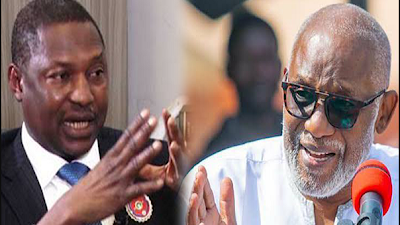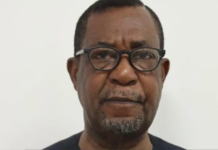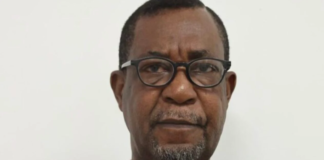
Ondo State Governor Rotimi Akeredolu and Attorney-General of the Federation (AGF) yesterday disagreed over restructuring of Nigeria.
While the governor insisted on devolution of power in favour of states and councils, Malami criticised governors for controlling councils and turning around to ask for more powers.
Both of them, who are Senior Advocates of Nigeria (SANs) spoke in Lagos at the ongoing Attorneys-General meeting.
Akeredolu, who delivered the keynote address, said the Federal Government’s inability to secure life and property would force citizens to arm themselves in self-defence.
He believes the police, inadequately funded and equipped, were overwhelmed.
He added that state policing and restructuring were imperative.
Malami questioned governors’ moral authority to demand restructuring after usurping local government powers.
The 36 Attorneys-General are meeting for three days to discuss critical legal issues relating to $418 million Paris Club Refunds, Value Added Tax (VAT), stamp duty, and amendments to the 1999 Constitution.
Akeredolu and Malami were part of the speakers at the event.
Others were Governors Babajide Sanwo-Olu (Lagos) and Simon Lalong (Plateau), Lagos State Chief Judge, Justice Kazeem Alogba, Nigerian Bar Association (NBA) President Olumide Akpata and Director-General of the Nigerian Governor’s Forum, Asishana Okauru, amongst others.
NEWS: APC VP: Shettima tipped to be Tinubu’s running mate – Sources
Akeredolu, who urged states to emulate Lagos and push for restructuring via legal means, claimed that the Federal Government was getting way too much of the national income at the states’ and local governments’ expense.
“The Federal Government getting 52 per cent of the country’s revenue allocation is the main cause of the problem. There are some funds at the federal level that they don’t know what to do with. And the states and local governments are being starved. This is a direct consequence of long military rule,” the governor said.
Referencing the recent mass killings in a Catholic Church in Owo, he lamented that the police blamed the non-availability of vehicles for their inability to mobilise to the scene of the attack.
The governor asked the Police to “close shop” if the Federal Government could not meet its equipment needs.
“The Police have failed”, Akeredolu said, adding that a central police command was ineffective in keeping Nigerians safe.
“The current spate of insecurity in the country leaves us with no room for equivocation on the right of the states to maintain law and order through the establishment of state police,” he said.
Addressing the AGF, the governor said: “We will carry arms very soon. Oga Malami. There is no other way.”
The governor added that he and his family believed in Nigeria, which was why he and his son married outside the Southwest.
The governor further challenged states to restructure the country by, among others, setting up their anti-graft agencies or Anti-Corruption Commission.
He argued that the Economic and Financial Crimes Commission (EFCC) was a creation of and for the Federal Government of Nigeria only and not for the Federation of 36 states.
“If you have not done it (set up state anti-graft agencies) in your state, go and do it. Let the EFCC run after those who have infractions with the Federal Government, not states.
“We now use the EFCC to start pursuing even governors and you want to stay as if you are holier than everyone. You now use Federal Government agencies to oppress people in the states.
“So, go and promulgate your laws, establish your anti-graft agencies. We have done ours in Ondo State, or else EFCC will continue to pursue you. Is it only in states that they steal? I’m not saying you should be stealing,” Akeredolu said.
Malami accused governors of greed by coveting local government revenue.
He questioned the governors’ moral ground for their agitation for restructuring and state police in the face of this “compromise”.
The AGF wondered whether “a state governor that colonised the resources of a local government, that renders a local government inefficient and ineffective in the performance of its duties, security and otherwise has moral standing to now clamour and crave for restructuring against the backdrop of the inherent abuse associated with his conduct, with particular regard to the corporate existence of a state”.
He added: “A further question is whether a state governor that undermines the democratic process, that refuses to inaugurate members of the state house of assembly that were elected equally stands a moral ground to clamour for restructuring against the backdrop of the fact that he does not believe in allowing the system to effectively and efficiently operate?”
He also advised the AGs of respective states to perish the idea of establishing a body known as the ‘Body of Attorneys-General of the Federation’.
Malami said the name runs contrary to Section 150(1) of the 1999 Constitution (as amended) which established his office as the only AGF.
He said: “I have also observed the misnomer in the proposed name of the new body which you seek to float, that is, Body of Attorneys-General of the Federation.
“It is my considered view that this name conflicts with Section 150(1) of the 1999 Constitution (as amended) which established only one office of the Attorney General of the Federation.”
The AGF reacted to the controversial issue of the $418million Paris/London Club loan deductions and refunds which has pitted the states against the Federal Government.
According to him, he had always held the position that the governors were attempting to draw back on the terms of an agreement reached with relevant stakeholders.
Malami maintained that the respective AGs and their governors should have adopted an out-of-court settlement rather than opting for a prolonged legal battle on an agreement they reached on behalf of their states.
Governor Sanwo-Olu emphasised the importance of the office of the AG and encouraged the gathering to find legal ways to improve the Federal-state relationship.
“You know too well that in the Constitution it is only the Attorney-General that the constitution says you should appoint.
“Once you have the Attorney-General with you, you don’t even need commissioners or special advisers again. So that goes to explain how important and how critical your roles are for us,” he added.
Governor Lalong, who was represented by Plateau State AG, Chris Ahmadu, narrowed down the issues.
“The issue of Value Added Tax should have been straightforward. As lawyers we know it’s not in the Exclusive Legislative List.
“So, how do we come to an arrangement where the states and the Federal Government will equally partake for the good of all?” he queried.
According to reports, the meeting is scheduled to end today.










